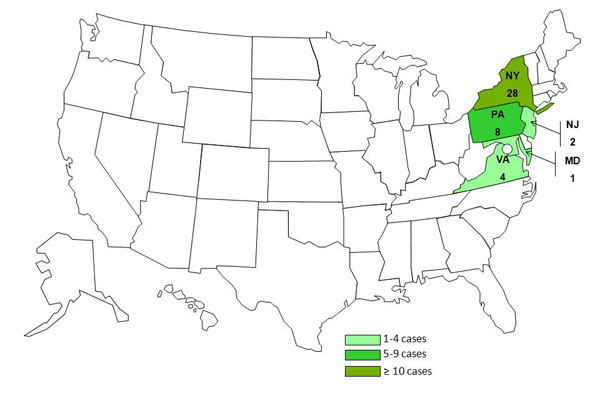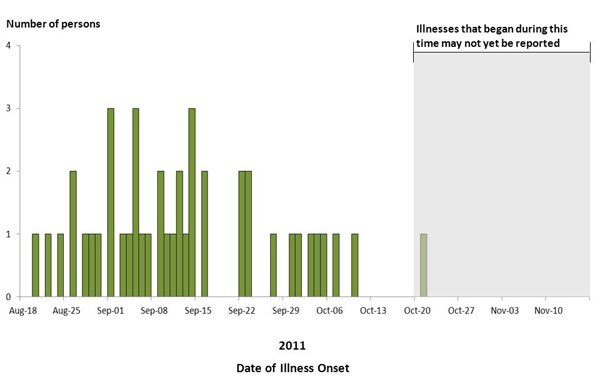2011 Salmonella Outbreak Linked to Turkish Pine Nuts
NOTICE: This outbreak is over. The information on this page has been archived for historical purposes only and will not be updated.
Posted November 17, 2011
Outbreak Summary
CDC collaborated with public health and agriculture officials in New York and other states and the U.S. Food and Drug Administration (FDA) to investigate a multistate outbreak of Salmonella Enteritidis infections linked to Turkish pine nuts purchased from bulk bins at Wegmans grocery stores. Representatives from Wegmans cooperated with public health officials throughout the investigation. Public health investigators used DNA “fingerprints” of Salmonella bacteria obtained through diagnostic testing with pulsed-field gel electrophoresis, or PFGE, to identify cases of illness that may have been part of this outbreak. They used data from PulseNet, the national subtyping network made up of state and local public health laboratories and federal food regulatory laboratories that performs molecular surveillance of foodborne infections.
A total of 43 individuals infected with the outbreak strain of Salmonella Enteritidis were reported from 5 states. The number of ill persons identified in each state with the outbreak strain was as follows: Maryland (1), New Jersey (2), New York (28), Pennsylvania (8), and Virginia (4).
Among 43 persons for whom information was available, illnesses began on or after August 20, 2011. Ill persons ranged in age from <1 to 94 years, and the median age was 43 years old. Sixty percent of patients were female. Two patients were hospitalized. No deaths were reported.
The outbreak can be visually described with a chart showing the number of people who became ill each day. This chart is called an epi curve. This takes an average of 2 to 3 weeks. Please see the Timeline for Reporting Cases of Salmonella Infection.
Outbreak Investigation
Epidemiologic and laboratory investigations conducted by officials in local, state, and federal public health, agriculture, and regulatory agencies linked this outbreak to eating Turkish pine nuts sold in bulk bins at Wegmans grocery stores. Some Turkish pine nuts were consumed as an ingredient in prepared foods, such as Caprese salad or asparagus with pine nuts, sold at Wegmans stores. These pine nuts were imported from Turkey.
Among 40 ill persons for whom information was available, 28 (70%) reported consuming Turkish pine nuts or products containing these pine nuts in the week before their illness began.
Early in the investigation, shopper card information was collected and used to identify which specific products to suspect as sources of illness. Ill persons gave permission for public health officials to retrieve shopper card purchase information. A review of shopper card records identified that ill persons had purchased the same type of Turkish pine nuts from bulk bins at different locations of Wegmans grocery stores before becoming ill.
Laboratory testing conducted by public health laboratories in several states has identified the outbreak strain of Salmonella Enteritidis from 14 samples of Turkish pine nuts or pesto containing Turkish pine nuts.
- The Virginia Division of Consolidated Laboratory Services isolated the outbreak strain of Salmonella Enteritidis from Turkish pine nuts that were purchased from bulk bins at Wegmans stores and collected from an ill person’s home, and from retail samples of Turkish pine nuts collected from a Wegmans store where ill persons reported shopping.
- The New York State Department of Health, Wadsworth Center Laboratory, isolated the outbreak strain of Salmonella Enteritidis from three separate samples of homemade pesto containing Turkish pine nuts from three unrelated ill persons’ homes. In addition, culture of two samples of Turkish pine nuts which were purchased from bulk bins at different Wegmans stores and collected from two ill persons’ homes (one who also provided one of the pesto samples) yielded the outbreak strain.
- The Pennsylvania Department of Health Bureau of Laboratories isolated the outbreak strain of Salmonella Enteritidis from two samples of homemade pesto containing Turkish pine nuts from an ill person’s home, and from Turkish pine nuts which were purchased from bulk bins at two Wegmans stores and collected from two unrelated ill persons’ homes.
- The Maryland Department of Health and Mental Hygiene isolated the outbreak strain of Salmonella Enteritidis from a sample of pesto containing Turkish pine nuts, and from a sample of Turkish pine nuts which were purchased from bulk bins at a Wegmans store and collected from an ill person’s home. The outbreak strain was also isolated from a sample of bulk pine nuts collected from a second Wegmans store in Maryland that was not associated with any illnesses.
In addition, laboratory testing conducted by FDA isolated the outbreak strain of Salmonella Enteritidis from Turkish pine nuts collected by FDA from a warehouse used by Sunrise Commodities and from a warehouse used by a customer of Sunrise Commodities.
Recall Information
On October 26, 2011, Wegmans Food Markets, Inc. recalled approximately 5,000 lbs. of Turkish Pine Nuts sold in the Bulk Foods department of most Wegmans stores in New York, Pennsylvania, New Jersey, Virginia, and Maryland between July 1 and October 18, 2011.
On November 4, 2011, Badia Spices, Inc. recalled approximately 3,800 lbs. of pine nuts. Badia Spices, Inc. repacked bulk pine nuts which were imported from Turkey and subsequently recalled by Sunrise Commodities of Englewood Cliffs, N.J. These pine nuts were sold in retail stores in Florida, New York, Pennsylvania, Maryland, and New Jersey between June and October 2011.
On November 9, 2011, FDA confirmed the presence of Salmonella on tested Turkish pine nuts distributed by Sunrise Commodities. The company voluntarily recalled four lots of the bulk Turkish pine nuts, totaling more than 21,000 pounds. Each lot was packed in 22-pound boxes. Sunrise Commodities distributed the Turkish pine nuts in bulk to various food vendors in Florida, New Jersey, New York, and Canada. Sunrise Commodities issued a recall notification to its customers dated November 3, 2011, alerting them of the test results and of the epidemiologic investigation and asking them to notify their subsequent customers of the recall.
Clinical Features/Signs and Symptoms
Most persons infected with Salmonella bacteria develop diarrhea, fever, and abdominal cramps 12 to 72 hours after infection. The illness usually lasts 4 to 7 days, and most persons recover without treatment. However, in some persons, the diarrhea may be so severe that the patient needs to be hospitalized. Salmonella infection may spread from the intestines to the bloodstream and then to other body sites and can cause death unless the person is treated promptly with antibiotics. Older adults, infants, and those with impaired immune systems are more likely to have a severe illness from Salmonella infection.
Advice to Consumers, Retailers, and Others
This particular outbreak appears to be over. However, Salmonella is still an important cause of human illness in the United States. More information about Salmonella, and steps people can take to reduce their risk of infection, can be found on the CDC Salmonella Web Page and the CDC Vital Signs Web Page.
Consumers might still have recalled products in their homes if the pine nuts or foods made with pine nuts were frozen.
- Consumers should check their homes, including refrigerators and freezers, for Turkish pine nuts purchased from bulk bins at Wegmans stores between July 1, 2011 and October 18, 2011 and not eat them. Consumers should also not eat any foods prepared with the recalled product, including pesto, salads, and baked goods.
- Restaurants and food service operators should not serve the recalled product.
- Consumers, retailers, and others who have any of the recalled product should dispose of it in a closed plastic bag placed in a sealed trash can. This will prevent people or animals from eating it.
- Persons who think they might have become ill from eating possibly contaminated recalled products should consult their health care providers. Infants, older adults, and persons with impaired immune systems are more likely than others to develop severe illness.
Key Resources
- Badia Spices Recalls Pinenuts Because of Possible Health Risk
- Wegmans Food Markets, Inc. Announces Recall of Bulk Turkish Pine Nuts Due to Possible Salmonella Contamination
- FoodSafety.gov
CDC’s Role in Food Safety
As an agency within the U.S. Department of Health and Human Services (HHS), CDC leads federal efforts to gather data on foodborne illnesses, investigate foodborne illnesses and outbreaks, and monitor the effectiveness of prevention and control efforts. CDC is not a food safety regulatory agency but works closely with the food safety regulatory agencies, in particular with HHS’s U.S. Food and Drug Administration (FDA) and the Food Safety and Inspection Service within the United States Department of Agriculture (USDA). CDC also plays a key role in building state and local health department epidemiology, laboratory, and environmental health capacity to support foodborne disease surveillance and outbreak response. Notably, CDC data can be used to help document the effectiveness of regulatory interventions.
Final Case Count Map
Persons infected with Salmonella Enteritidis, United States, by state, as of November 16, 2011 (n=43)

A total of 43 individuals infected with the outbreak strain of Salmonella Enteritidis were reported from 5 states. The number of ill persons identified in each state with the outbreak strain was as follows: Maryland (1), New Jersey (2), New York (28), Pennsylvania (8), and Virginia (4).
Final Epi Curve
Persons infected with the outbreak strain of Salmonella Enteritidis, by date of illness onset*

*n=43 for whom information was reported as of November 16, 2011. Onset data not currently available for all persons with reported illness.